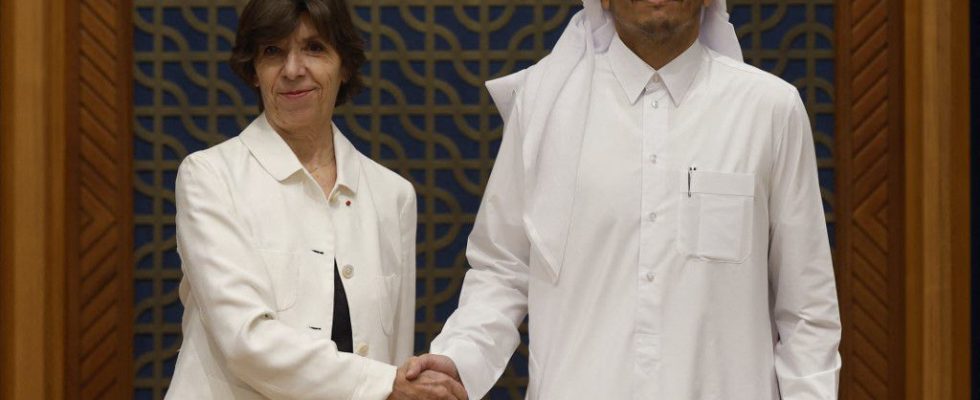Words have weight. Almost a month after the terrorist attacks perpetrated by Palestinian Hamas against Israel on October 7, the French Minister of Foreign Affairs, Catherine Colonna, traveling to Doha, Qatar, called this Sunday for an “immediate humanitarian truce”. She wants this to be “sustainable and sustained” in order to lead to “a ceasefire”. According to her, France is working to have a text to this effect adopted by the UN Security Council, which has been very divided on the subject since the start of the war.
For a month, Israel has continued its offensive in the Gaza Strip to “eliminate the Palestinian Islamist movement”, which it has classified as a terrorist organization along with the United States and the European Union. Result: more than 9,000 deaths according to figures from the Hamas Ministry of Health, a toll that no independent source is able to verify, 1.4 million people displaced within the small Palestinian territory according to United Nations and unprecedented destruction. A catastrophic humanitarian situation denounced by many foreign countries. However, the solutions proposed by the latter differ.
Various opinions
Recently, the comments of French MP Benjamin Haddad relaunched the semantic debate. On France 2, Thursday November 1, the Renaissance elected official said he was not in favor of a “ceasefire” between Israel and Hamas but a “humanitarian truce”. “Israel has the right to defend itself against terrorism” but “this war must be waged, that was the message from the President of the Republic, in compliance with international humanitarian law, in the protection of civilians. “that’s why France is committed to having humanitarian truces, that is to say breaks to be able to deliver humanitarian aid to civilians,” he said. This has earned him criticism from part of the French left, which since the start of the conflict has called on the French government to demand a “ceasefire”, in the same way as the Arab countries in particular.
Because internationally too, the positions are diverse. During the trip of the head of American diplomacy, Antony Blinken, to Jordan, Saudi Arabia, Qatar, the United Arab Emirates, Egypt and Jordan reiterated their call for a “ceasefire” aligned with the UN position. For his part, Antony Blinken said he was in favor of “humanitarian pauses” to spare Palestinian civilians trapped in the war and to accelerate the sending of aid to the besieged Gaza Strip.
Moreover, even within the European Union, the Member States are divided: if France, Germany or even Austria advocate the need for a “humanitarian truce” or “humanitarian windows” to use the terms of the German government, Ireland and Spain are calling for an “immediate humanitarian ceasefire”.
War of words
But what does international law really say about these notions? According to the International Committee of the Red Cross (ICRC), “a humanitarian truce is a temporary suspension of hostilities, agreed between the parties to the conflict for purely humanitarian purposes. It is generally limited in time and space”. On the other hand, a “ceasefire” may be desired “for multiple reasons”, Thibaut Fleury Graff, professor of international law at Paris Panthéon-Assas University, admits to L’Express. It can not only be established for humanitarian objectives (medical assistance, food aid, movement of populations, etc.) but also with a view to peace negotiations or to rest the armed forces, for example.
In other words, “the ceasefire is a temporary suspension of fighting”, according to the lawyer. On its website the NGO Doctors Without Borders specifies that “it can be declared unilaterally or negotiated between the parties to the conflict”. In general, it is accompanied by a formal political process to defuse the conflict: withdrawal of weapons, repositioning of forces… “. In this case, the two notions are used somewhat indifferently here, they both have the aim of allowing relief to civilians caught in the conflict between Israel and Hamas”, admits the jurist Thibaut Fleury Graff who nevertheless considers that “the most appropriate expression in the current situation would be a “ceasefire” in view to enable humanitarian relief.”
On a political and diplomatic level, the choice of words seems to have more importance. In its guide, the UN also recognizes that it is done “based on preferences, as well as political, cultural and contextual sensitivities linked to the conflict”. For most foreign countries, a “ceasefire” agreement would in effect mean an end to fighting – which would therefore not allow Israel to defend itself against Hamas terrorists – while a “humanitarian truce ” would simply allow a pause in hostilities so that civilians can leave war zones. Hence the importance of choosing your words carefully.
